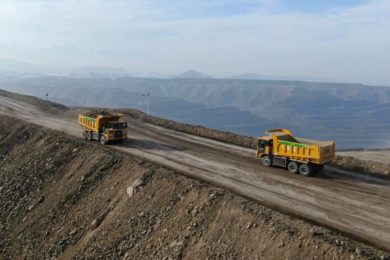 There is new energy to harness the job-creating ability of the mineral sector, after the National Planning Commission admitted that South Africa had missed the boat during the recent commodity boom. But the industry and government need to be practical about how any new plans are to be brought to life, according to Roger Dixon, chairman of leading engineering consultants SRK Consulting.
There is new energy to harness the job-creating ability of the mineral sector, after the National Planning Commission admitted that South Africa had missed the boat during the recent commodity boom. But the industry and government need to be practical about how any new plans are to be brought to life, according to Roger Dixon, chairman of leading engineering consultants SRK Consulting.
In the run-up to the Investing in African Mining Indaba in Cape Town in February, Dixon highlighted the need to reassure investors – both local and foreign – not just about South Africa’s intention to reinvigorate the sector but its practical ability to implement its new commitment.
The much-praised National Development Plan, published in November 2011, made a frank judgement on the poor shape of the mining industry: despite the country’s clear mining potential – especially in minerals like platinum and manganese – the sector “has failed to benefit fully from the commodity boom of the last decade or more,” said the authors of the plan.
In fact, between 2001 and 2008, the sector shrank 1% a year while other mineral exporting countries grew by 5% on average; this has left the industry smaller than it was in 1994, and the nation has paid the price in lost job opportunities, tax revenue and foreign earnings.
“It is helpful that the NPC has been so candid about this, because everyone needs to realise that the mining sector can’t go on like this,” said Dixon. “The commission also made it clear that the reasons behind our poor performance still need to be dealt with: uncertainty in the regulatory framework and property rights; electricity shortages and rising prices; weakness in infrastructure, especially rail, ports and water; and skills gaps.”
He said research showed it was possible that mining could create between 100,000 and 200,000 jobs in the next 10 to 15 years, if these challenges could be addressed and mining could reach growth rates of 3-4%.
“We are seeing some good ideas coming out of the commission, and we must now generate the momentum to see these ideas into action,” said Dixon. “The question of how to implement the changes we need is a daunting one, and it is also constrained by our limited supply of technical, scientific and management skills.”
He lauded the government’s intention to allow for easier migration of strategic skills into the country, including the suggestion that foreign graduates from South African universities be given work permits for a period of time after successfully completing their studies.
“The mining sector could certainly benefit from the skills of foreign students who graduate from our mining schools,” he said. “Indeed, we should be making ourselves as attractive as possible to these kinds of professionals.”
Outside of the technical and financial issues that will be addressed at the Cape Town conference, there are broader social and political pressures that all stakeholders in the industry need to address – which the organisers have realised and built into the program.
“Around Africa, there is a growing urgency in the demand for jobs and a reasonable standard of living, and there are great expectations of the mining sector from the ranks of the poor and unemployed,” said Dixon. “While the relevance of this issue is not limited to mining companies, the conference itself has shown a growing interest in corporate social responsibility – and how mining in Africa relates to communities and their development.”
Dixon said that all delegates should take advantage of the global forum that the conference provides, to share practical solutions to the obstacles that prevent the continent’s minerals from benefiting wider communities within ‘host’ countries.








